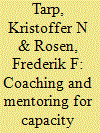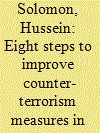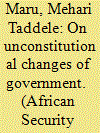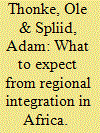| Srl | Item |
| 1 |
ID:
111538


|
|
|
|
|
| Publication |
2012.
|
| Summary/Abstract |
Coaching and mentoring for capacity' is becoming increasingly important in the state-building toolbox. If executed properly, this instrument is believed to be significantly more effective than traditional technical assistance and would consequently seem to hold great promise for the state- and peacebuilding agenda. The latest offshoot of this development is the Initiative for Capacity Enhancement in South Sudan. The initiative seeks to enhance the capacity of the South Sudanese state apparatus by deploying civil servants from neighbouring nations to coach their South Sudanese counterparts. This paper explores this particular initiative with the aim of identifying insights about designing coaching and mentoring programmes for capacity development.
|
|
|
|
|
|
|
|
|
|
|
|
|
|
|
|
| 2 |
ID:
111539


|
|
|
|
|
| Publication |
2012.
|
| Summary/Abstract |
In recent years, South Africa has come to be used by international terrorists as a safe house, for paramilitary training purposes, as a base from which to plan attacks on other countries and as a conduit for financial transactions. South Africa's own counter-terrorism initiatives have been labelled 'reactive' by analysts. Indeed, the existing counter-terrorism regime suffers from a lack of political will to issues of corruption and ineptitude bedevilling the security apparatus of the state. However, using lessons learned from other countries, Pretoria can yet turn the tide against international terrorism by adopting more pro-active measures and by undertaking steps aimed at the depoliticisation and decriminalisation of the security forces.
|
|
|
|
|
|
|
|
|
|
|
|
|
|
|
|
| 3 |
ID:
111537


|
|
|
|
|
| Publication |
2012.
|
| Summary/Abstract |
Since the terrorist attacks of 11 September 2001, the continent of Africa, particularly Greater East Africa, has played an increasingly signifi cant role in United States (US) national security strategy. Transnational security threats and political authoritarianism continue to plague the region, creating calls for greater US and international involvement. Before reacting to the situation, however, it is prudent to pause, reflect, and understand that the United States developed strategic relations with nation-states in the region well before contemporary concerns for international terrorism and ungoverned spaces entered the strategic lexicon. Toward a more comprehensive understanding of Greater East Africa's strategic history, this paper examines the core strategic relationship in the region, US-Kenya relations, its origins and implications, and offers policy recommendations that will affect future international security.
|
|
|
|
|
|
|
|
|
|
|
|
|
|
|
|
| 4 |
ID:
111541


|
|
|
|
|
| Publication |
2012.
|
| Summary/Abstract |
This short paper discusses the North African uprisings that led to the change of leadership in Tunisia and Egypt, and the issues surrounding the recognition of the National Transitional Council (NTC) of Libya by the African Union (AU) after the killing of Muammar Gaddafi. In doing so, the paper analyses the uprisings in North Africa vis-à-vis the AU normative frameworks related to unconstitutional changes of government and democratic constitutionalism. The implications of these AU policies on the recognition of the NTC and how the AU recognised the NTC afterwards is also discussed. Finally, some recommendations are made with regard to how the AU should deal with similar uprisings in Africa in the future.
|
|
|
|
|
|
|
|
|
|
|
|
|
|
|
|
| 5 |
ID:
111542


|
|
|
|
|
| Publication |
2012.
|
| Summary/Abstract |
The dramatic events of the Arab Spring have changed the political landscape in Africa and showed up both the need for and the shortcomings of the African Union. The author looks at the impact of the past year on security issues across Africa.
|
|
|
|
|
|
|
|
|
|
|
|
|
|
|
|
| 6 |
ID:
111540


|
|
|
|
|
| Publication |
2012.
|
| Summary/Abstract |
This paper provides a comparative overview of the vast topic of regional integration in Africa. Unlike most literature it includes both security and economic aspects of regional integration. Overall, three mega-trends working in Africa currently will increase the conflict potential in the coming decades unless economic transformation takes off and millions of new jobs are created. Meeting the challenges in the medium term, regional integration is a wise strategy, since it has the potential to deliver conflict mitigation and economic development. The Regional Economic Communities (RECs) in Africa are diverse, dynamic and on different levels of development. Some have progressed tremendously while others have been stalling for decades. As such, they will deliver differently. The vision of a Pan-African Economic Community is not likely to be realised before the deadline of 2028. However, in regions where economic and/or security interests converge and challenges are handled, the RECs may be at similar and in some aspects more advanced levels than the EU of today.
|
|
|
|
|
|
|
|
|
|
|
|
|
|
|
|